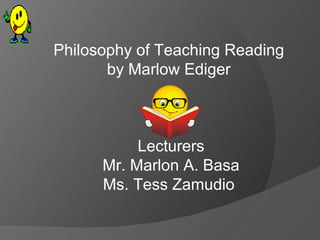
Philosophy Of Teaching Reading
- 1. Philosophy of Teaching Reading by Marlow Ediger Lecturers Mr. Marlon A. Basa Ms. Tess Zamudio
- 2. Different Philosopies 1. Realism 2. Idealism & Perennialism 3. Individualized Reading 4. Eclectic(ism)
- 3. Realism
- 4. Main Thrust One can know the real world as it truly is on itself. This presupposes that one can pre-determine what a student should know and be able to do.
- 5. Reading Connection 1. Correct phoneme and grapheme association 2. Distinguishing Facts from Opinions 3. Develop the Reading Experience of : a.Identifying the problem b.Gathering information c.Answering the problem d.Developing a hypothesis e.Testing the hypothesis f. Revising the hypothesis
- 6. Strengths 1. For teachers: Gives focal points in instruction 2. Instructions: Gives Focal points for learning activities 3. Tests/Evaluations: Provides High Validity
- 8. Main Thrust One cannot know the real world but there are ideas than can pertain thereto. This presupposes that no-one can determine what a student should know and be able to do.
- 9. 1. Classics are the best source of providing subject matter worthy of reading 2. Teacher's Reading interest must go vis-a-vis level of students reading readiness 3.it is the thought that counts Reading Connection
- 10. Strengths 1. For teachers: It can bring out the personal “dynamism” in them 2. For students: It can provide the personal “experience” 3. Tests/Evaluations: Open-ended questions may be used
- 11. Philosophy of Individualized Reading
- 12. Main Thrust Individual endeavors are highlighted. No one can mandate what a student should read but only his interests, personal meanings and purposes.
- 13. Reading Connection 1. The whole is more important than the parts. 2. Self-paced reading is given importance.
- 14. Strengths 1. Teachers: Promotes opportunity for Facilitating 2.Students: Promotes Academic Freedom 3. Tests/Evaluations: Not Required
- 15. Ecletic Philosophy of Reading Instruction
- 16. Main Thrust Collaboration is the key towards success. This implies that authors(manual makers), may share their personal classroom experiences to be considered(or not) by classroom teachers.
- 17. Reading Connection 1. There is consideration in teacher's classroom reading needs. 2. Syllabication instructions may be used.(based on classroom needs)
- 18. Strengths 1. For Teachers: Creativity is encouraged 2. For Students: Personal/Group Needs are addressed 3.Tests/Evaluation: Validity is reinforced